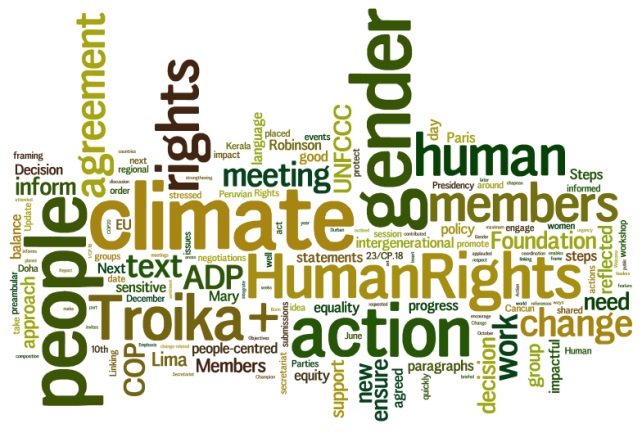Troika+ Women Leaders on Gender and Climate Change meet during Bonn Climate Change Intersession
During the Climate Change Intercessional in Bonn this June, Mary Robinson, President of the Mary Robinson Foundation – Climate Justice, invited members of the Troika+ of Women Leaders on Gender and Climate Change to discuss and promote a people-centred approach to climate action.
Participants included, among others, Troika+ members Christiana Figueres, Executive Secretary of the Climate Change Secretariat of the UNFCCC, Connie Hedgaard, the European Commissioner for Climate Action, the Dutch Minister for the Environment, Wilma Mansveld and a delegation from the South African Ambassador at Large for Climate Change who came together to exchange ideas and share experiences on the following two topics:
- How to further strengthen the participation of women and to promote gender sensitive climate policy
- How to Identify ways of strengthening the integration of human rights into the work of the UNFCCC process
In her opening remarks, Mary Robinson spoke about the need to build positive momentum for a new climate agreement. She said:
“To make sure that climate action benefits all people as well as the climate, we need to guarantee that our climate action is fair and protects human rights. In order to achieve this we also need to give grassroots practitioners a platform to participate in dialogues with policy makers and to share the lessons learned from their experience.”
Aira Kerala, Senior Gender Adviser from Finland, was invited to brief the meeting on the progress on implementing the Decision 23/CP.18 that has placed gender on the agenda of the COP decision. She shared an update and the outcomes of a very well attended gender workshop at COP 19 in Warsaw and discussed plans for next steps at COP 20 in Lima with the Troika+ members.
During the discussion, Mary Robinson and the present women leaders highlighted the need for further work on gender participation and gender sensitive climate policy, referring to already achieved successes like the “Doha miracle” at COP 18 in Doha.
The participants of the Troika+ meeting also agreed the need for human rights to be an integral part of any future climate action, but especially to be enshrined in the text of the COP agreements at COP20 in Lima and COP21 in Paris, in order to ensure that the resulting climate action is having a positive effect for people as well as the climate.
The Foundation is currently working on a position paper on a people-centred framing for the 2015 agreement focusing on gender equality, human rights and intergenerational equity which will be published in due course.
Related Links
Troika+ Women Leaders on Gender and Climate Change


